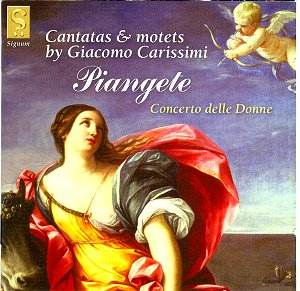|
|
Search MusicWeb Here |
|
 |
||
|
Founder:
Len Mullenger (1942-2025) Editor
in Chief:John Quinn
|
|
|
Search MusicWeb Here |
|
 |
||
|
Founder:
Len Mullenger (1942-2025) Editor
in Chief:John Quinn
|

|
Piangete:
Cantatas and Motets by Giacomo Carissimi Giacomo CARISSIMI (1605-1674) Cum reverteretur David, motet for 3 voices and bc [04:09] Benedictus Deus et Pater, motet for 3 voices and bc [[04:30] Girolamo FRESCOBALDI (1583-1643) Partite sopra La Monicha for keyboard [07:17] Giacomo CARISSIMI Exulta, gaude, filia Sion, motet for two voices and bc*/*** [05:07] Giovanni Girolamo KAPSBERGER (c1580-1651) Toccata XI for chitarrone [02:01] Giacomo CARISSIMI Va dimanda al mio pensiero, cantata for solo voice and bc [05:38] Giovanni Girolamo KAPSBERGER Prelude XI for chitarrone [00:36] Giacomo CARISSIMI O dulcissimum Mariae nomen, motet for two voices and bc*/** [03:31] Siam tre miseri piangenti, cantata for three voices and bc [08:16] Michelangelo ROSSI (1601/02-1656) Toccata VII for keyboard [04:07] Giacomo CARISSIMI Surrexit pastor bonus, motet for three voices and bc [02:23] Ahi, non torna, cantata for two voices and bc**/*** [05:06] Piangete, ohimè piangete, cantata for solo voice and bc* [05:42] Giovanni Girolamo KAPSBERGER Prelude X for chitarrone [00:54] Giacomo CARISSIMI Si dia bando, alla speranza, cantata for solo voice and bc** [03:47] Omnes gentes gaudete cum victore, motet for three voices and bc [03:39] Donna Deam*, Gill Ross**, Elin Manahan Thomas***, soprano; David Miller, chitarrone; Alastair Ross, harpsichord, organ Recorded in February 2001 at the Church of St Lawrence, West Wycombe, UK, DDD |
| CD available for post-free online mail-order or you may download individual tracks. For some labels you can download the entire CD with a single click and make HUGE savings. The price you see is the price you pay! The full booklet notes are available on-line. |  |
|
NOTE • Click on the button and you can buy the disc or read the booklet details • You can also access each track which you may then sample or down load. • Further Information. |
|
|
|
ADDITIONAL INFORMATION •
You can sample only 30 seconds (or 15% if that is longer) of a given track. Select from the View tracks list. Each sample will normally start from the beginning but you can drag the slider to any position before pressing play. • PLEASE NOTE: If you are behind a firewall and the sound is prematurely terminated you may need to register Ludwig as a trusted source with your firewall software.
•You will need Quicktime to hear sound samples. Get a free Quicktime download here • If you cannot see the "Sample All Tracks" button you need to download Flash from here.
|
|
|
Return to Index |